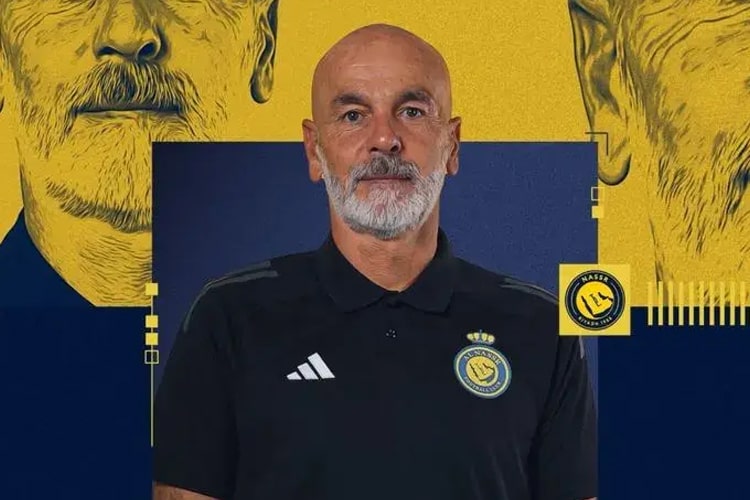Ronaldo sees coach return to Serie A after a year without trophies

As expected, Stefano Pioli has left Al-Nassr. The Italian coach is set for a return to Serie A. Who will take over as the new manager of Cristiano Ronaldo’s club and possibly also Dávid Hancko’s remains to be seen.
After just one season in Saudi Arabia, Stefano Pioli is set to make his return to Italian football.
The 59-year-old Italian coach, who left AC Milan in the summer of 2023 for a lucrative move to Al-Nassr, is expected to be announced soon as the new manager of Fiorentina. While his departure from Saudi Arabia had been anticipated for months, the speed of the transition and the broader implications for both clubs Al-Nassr and Fiorentina are now becoming clearer.
Pioli arrived at Al-Nassr amid great expectations. He was coming off a successful spell with Milan, during which he ended the club’s decade-long title drought by guiding them to the Serie A championship in 2022. Al-Nassr, bankrolled by Saudi Arabia’s powerful sports investment projects, saw in Pioli a tactically sound, experienced European coach capable of harnessing the talents of a star-studded squad led by none other than Cristiano Ronaldo. With further reinforcements, including high-profile names from Europe and South America, the ambition was to dominate domestically and push hard in continental competitions such as the AFC Champions League.
But things didn’t go as planned. Despite flashes of brilliance and individual performances from players like Ronaldo, Sadio Mané and Otávio, the team often lacked cohesion and failed to impose itself in key matches. Al-Nassr ended the Saudi Pro League season in a disappointing third place well behind dominant rivals Al-Hilal and failed to lift a single trophy across domestic or international tournaments. For a club with ambitions not just to compete but to lead the Saudi football revolution, that was simply unacceptable.
The pressure on Pioli mounted as the season progressed. Although he retained the support of several senior players, there were persistent reports of internal friction regarding training methods, squad rotation, and tactical rigidity. His pragmatic, often conservative style clashed with the club’s desire for high-intensity, attacking football. Meanwhile, in Europe, critics argued that Pioli’s move had been more about money than sporting ambition an accusation that gained traction as Al-Nassr’s results faltered.
Now, just one year into what was expected to be a multi-season project, Pioli is returning to a much more familiar environment. Fiorentina, who recently parted ways with Raffaele Palladino after a disappointing campaign, see Pioli as the right man to steady the ship and rebuild the team around a clear footballing identity. His prior spell in Florence (2017–2019) was viewed as moderately successful—marked by tactical discipline, a strong connection with the fans, and the development of young players. The club believes that, with the added experience Pioli has gained at Milan and abroad, he can take La Viola to the next level and push for European qualification consistently.
The timing is also symbolic. Fiorentina are in a transitional phase, having struggled to define themselves in recent seasons neither genuine title contenders nor a stable Europa League fixture. With Pioli’s return, the club is betting on familiarity, experience, and a clear identity. The new project will likely focus on balancing veterans like Giacomo Bonaventura and Cristiano Biraghi with promising younger talents and smart signings from Serie B and mid-table clubs. Pioli’s well-known preference for a 4-2-3-1 or adaptable 4-3-3 system could suit Fiorentina’s current squad, but the summer transfer window will be crucial in shaping his team.
On the other side of this story is Al-Nassr, who now face an urgent managerial search. The Saudi club is once again on the market for a top-tier coach who can handle the pressure of managing international stars while delivering results in a league that is quickly becoming one of the most competitive outside of Europe. Two names are currently emerging as frontrunners: Marc Brys and Jorge Jesus.
Marc Brys, the current head coach of the Cameroon national team, is seen as a left-field but intriguing option. Known for his strict discipline, tactical structure, and ability to work in multicultural environments, the Belgian manager could bring much-needed order to Al-Nassr’s dressing room. However, his lack of experience at clubs with such high-profile squads may be a point of concern.
Jorge Jesus, by contrast, is a more familiar name in the region. He recently left Al-Hilal after winning multiple trophies and has deep knowledge of Saudi football, the expectations of its top clubs, and the political dynamics surrounding the league’s massive investments. Jesus is also known for his fiery personality and demanding nature, which could either galvanize or divide a dressing room led by Ronaldo.
Off the pitch, Al-Nassr is also making moves in the transfer market. One of the names on their shortlist is Dávid Hancko, the Slovak international defender currently playing for Feyenoord. Hancko, who can operate as both a center-back and a left-back, has impressed with his athleticism, passing range, and positional awareness. With defensive frailties being a recurring issue for Al-Nassr this past season, Hancko is seen as a potential cornerstone for the club’s backline. Negotiations with Feyenoord are expected to continue in the coming weeks, and his arrival may also depend on the preferences of the new manager.
In the grander scheme, Pioli’s short-lived Saudi adventure is another reminder of the challenges European coaches face in the Gulf region. High wages and global stars may be attractive, but expectations are enormous, and the margin for error is slim. For Fiorentina, his return is a calculated gamble on a coach they know and trust. For Al-Nassr, it’s yet another reset in a long quest for regional dominance and international recognition.
Whether either side emerges stronger from this split will depend on what comes next—but one thing is certain: the 2024–25 season is shaping up to be a defining moment for both Stefano Pioli and the clubs he’s leaving and rejoining.